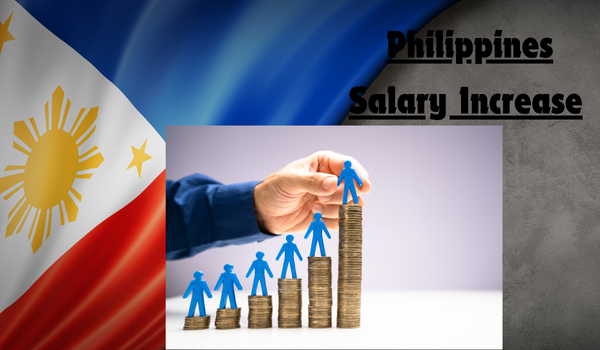Get the latest updates regarding the Philippines Salary Increase 2024: When The Salary is Increasing and Who gets it? The Philippines’ workforce will see a major change in 2024. There will be a salary hike for both public and private sector employees. Considering the contribution of civilian government employees, the Senate introduced the bill, which proposed a hike in four-tranche salaries. This article will briefly describe the anticipated effects of salary hikes on several workforce sectors.
Contents
Philippines Salary Increase 2024
Considering the valuable contributions of the Philippines workers, the Senate has introduced the bill for a four-tranche salary hike. The bill aimed to rationalize and standardize remuneration across productivity, accountability, integrity, efficiency, excellence within civil services, and others. However, certain exemptions deprive the increments.
As per the latest updates, the median wage growth is expected to rise by 6.2% in 2024 from 6% in 2023. The labor market is influenced by numerous significant factors that cause wage growth. The factors include talent competition, demands of skilled professionals, and inflation pressure. For the private workforce, a salary hike of 7% for energy sectors, 6.8% for hight-tech, 6.7% for retail and wholesale, and 6.5% for consumer goods.
When The Philippines Salary is Increasing
The Department of Budget and Management devised the schedule of a four-tranche payment hike. The payment is scheduled to commence on 1 January 2024 and is intended to be implemented annually till 2027. The proposal has aligned with the Salary Standardization Law of 2019 which ensures that fair compensation will be provided to the government employees.

Senate Bill No. 2504 was introduced by Senator Christopher Lawrence T. Go and emphasised the significance of regular revision of services to keep the services of government attractive and reduce corruption. The average median salary in Asia was surpassed by the median salary of the Philippines, which is 6.2%. It emphasized the nation’s commitment to consider the workforce’s contribution.
Who gets The Increased Philippines Salary
?The public and private sector employees are poised for a transformative phase in the workforce. The government of the Philippines has proposed a bill to hike the salary of public and private sector wagers. The economic sustainability of a nation is crucial; thus, certain adjustments are made for both public and private employees.
For the public sector, the salary will be raised for the government civilian employees. Certain exemptions include uniformed personnel, military personnel, and government-owned or controlled corporation employees. The salary hike emphasizes recognising talented individuals, competition, skilled professionals, productivity, work quality, and inflation.
For the private sector, the salary will be raised for proficient workers, customers, retail industries, and shared services and outsourcing industries. The growth of these sectors or industries is anticipated, which requires skilled professionals. Through salary increments, the employees’ morale will be boosted, which will result in enhanced quality at the workplace.
Economic Implications of Philippines Salary Increase
The positive ripple impacts of salary increment are predicted in the economy and society. Some of these are as follows:
- Increment in Consumer Expenditure – More disposable income results from higher wages, which boosts consumer expenditure. This might increase the demand for goods and services, which eventually boost the economic activity of the nation.
- Reduction in Poverty – The government intends to lift people out of poverty through wage increments. Increased wages might assist workers financially so that they can afford better healthcare, education and manage other essential expenses.
- Inflation Control – The increased wage might contribute to the mitigation of inflation, which ensures economic sustainability.
Labor market dynamics might be shifted due to the hike in wages, as more skilled and productive workers are demanded. Professional development and upskilling might be incentivized among the employees due to salary increments.
All We Know
The salary hike has several challenges, including business costs, implementation, and inflation risks. The absorption of increased labor costs might be challenging for the SMEs. The balance management is crucial between hiked wages and inflation. The government has to ensure the implementation of hiked wages across all sectors and regions of the nation.
The hiked wages might impact specific sectors. It includes sectors like the service sector, agriculture, technology, and manufacturing industries. The salary increments enhanced the morale of workers and the quality of work, encouraged the rural workers, increased consumer expenditure, and retained skilled professionals.
For more information, readers should refer to the Philippines government’s official web portals and to read articles related to Philippines government programs and updates, frequently visit this web page.
